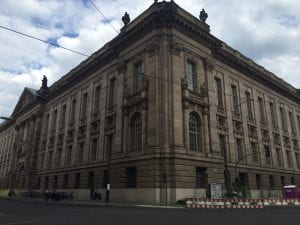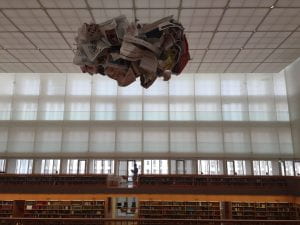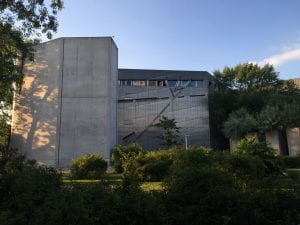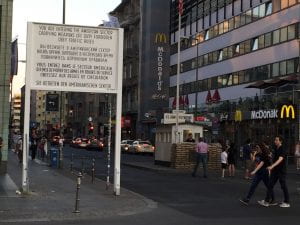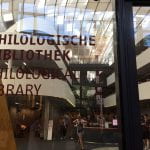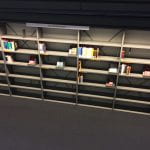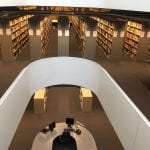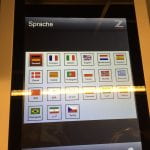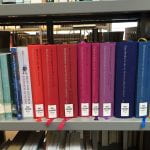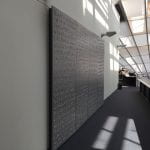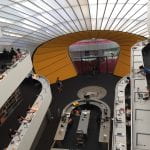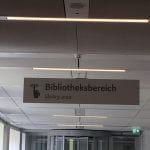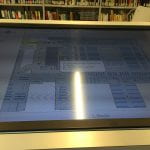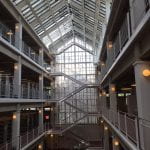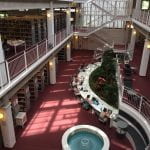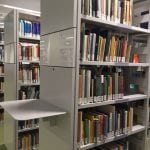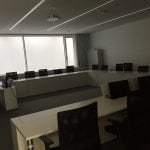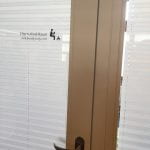This year has been the first year the University of Lincoln Library has participated in Erasmus+ International Staff Training Week programmes for librarians. It’s been absolutely wonderful to read and hear about the fantastic experiences my colleagues Oonagh and Ella had on their staff exchange trips! This is the third and final post in our series about GCW librarians’ experiences of Erasmus programmes around Europe.
Introduction
My Erasmus programme, ‘Libraries on the Move: Innovating Services for Research, Learning, and Publishing’, took place at the Freie Universität Berlin, a large and prestigious research university, with 11 departments, around 38,000 students and 336 professors. The Freie Universität (Free University) was founded in 1948 by students and staff who felt they could not learn and teach as they wished in the Soviet sector of the city. The programme consisted of a general day of introduction, three days of sessions and activities specific to the four international programmes running concurrently (libraries, career services, personnel development, and internationalisation), and a final morning of wrap-up and goodbye. It was an extraordinary week and I am delighted to share it with you.
Welcome: 17 June 2019
Tucked away in one of the university buildings on Otto-von-Stimson Straβe is the Ristorante Galileo, where all participants in the international programme were treated to a welcome and an excellent lunch. Dr Herbet Grieshop, head of the Office of International Affairs, introduced us to the international scope of the Freie Universität. I was impressed by the way the university prioritises the internationalisation of non-academic staff, providing them with a package of training and external activities including intercultural training, language instruction, and staff exchanges which leads to a certificate and formal recognition by the university.
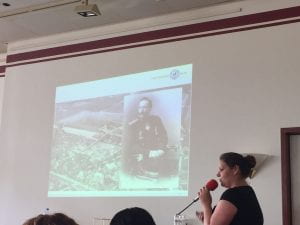
The afternoon rounded out with a helpful mini-lesson on how introduce ourselves and order food in German, and some icebreaker games allowed us to have fun getting to know one another. A series of separate introductions within the individual programme groups allowed us to meet our fellow librarians and share what had drawn us to the programme. For me, having become more involved in research support over the past year, I was drawn to this programme because I wanted to learn about research support in a very different library system. I was also intrigued by the library’s own specific research projects, such as the restitution of books looted by the Nazis.
In the afternoon and evening, I went out for a bit of exploration. I visited one of the two branches of the Staatsbibliothek zu Berlin; their collections are based on Prussian royal library, founded in 1661, and the reading room is astonishing beautiful. From there, I had walked to the Jewish Museum, but they closed early due to ongoing renovations, so I only saw the outside of their remarkable building.
Library Systems and Projects: 18 June 2019
The first day of the libraries programme focused on introductions: to each other, to the German libraries system, and to the branches and services of the Freie Universität libraries.
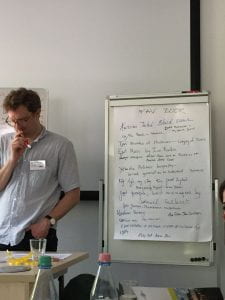
The University library system had consisted of many libraries but has undergone a series of merges in recent years, including the grafting of digital systems and library services, meaning that the library now has remits in e-learning, e-research, e-examination, and web development! Library staff introduced us to the German university and library system. The German government is a federal system, and Germany consists of 16 states, each with its own elected state government. Libraries fall within departments in charge of cultural heritage and education, which are the responsibilities of state governments, and librarians are mostly federal civil servants. Each state has the ability to make its own laws. As you might imagine, this means that there are a lot of possibilities for regional variation. Library systems differ between different universities; older institutions tend to have a decentralised structure consisting of lots of different specialised libraries. Newer institutions tend to have a centralised library structure. The Freie Universität’s move towards the latter structure has occurred in leaps and bounds:
- In 1970: the university had 190 libraries
- By 2015 these had been consolidated into 12 libraries
This historical and institutional background provided a fascinating and useful frame for the first of the day’s talks.
In ‘Library Management Systems in the Digital Age: 2.5 Years of Alma Experiences’, Leon Krauthausen, Johannes Hercher, Viola Taylor, and Dr Andrea Tatai, introduced us to the pluses and minuses of the FU’s adoption of the library management system which has been live since 2017, ALMA. Their previous library management system, Aleph, had been customised to fit their institution, and the adoption of a new system meant cataloguing, interface, and data conversion challenges. It sounded like an enormous amount of work, and the presenters were frank and generous in passing along their lessons learned. I was impressed with their care for providing users with a seamless experience during the implementation period, as well as the best possible experience afterwards.
After a delicious and abundant lunch at the campus vegetarian café (do not miss the desert case), we heard two amazing talks about library research projects. Elena Brasilier and Suzanna Paul explained the library’s efforts to find and return books looted by the Nazis in ‘Tracing the Life of ‘Nazi Looted’ books’. Between 1933 and 1945, Nazis seized a wide range of cultural heritage, and stole books from Jews, Freemasons, Catholics, Communists, socialists, Slavs, liberal politicians and parliaments. Agencies such as Jewish Cultural Reconstruction have restored looted books to other countries but of the millions of books stolen from their owners, most were never returned and simply became part of the collections of German libraries. Even though the university was founded in 1948, the library’s collections consist of around 250,000 books published before 1945. The project’s priorities are to find stolen books within the FU collections; trace their ownership and restore the stolen property to owners and heirs; publicise provenance of books and results of their research in a free online database; and carry out the work of remembrance. Dr Doris Tausenfreund introduced us to digital tools for oral history. The university collections and curates a number of collections of oral history interviews, and it was fascinating to hear about the process of gathering and indexing these, and their applications for teaching, research and learning. She spoke about five audiovisual interview collections, and focused particularly on the Forced Labour interview collection. The project team has been extremely active in making the database accessible for educational purposes: creating a learning application with abridged and translated interviews accompanied by background films to provide context, and customizable teaching materials.
We then gathered for a tour of one of the university’s most famous libraries: the Philological Library. Designed by Sir Norman Foster, it has been nicknamed the Brain because of its dual hemisphere structure. It houses books associated with the study of languages and provides over 600 spaces for students to work.
After an incredibly full and thought-provoking day, I headed to the nearby University Botanic Gardens, which were in full and glorious colour. Highly recommended for your next visit to Berlin!
E-examinations and Information Literacy: 19 June 2019
The next day started with a tour and talks of an unusual and intriguing space: one of Germany’s largest e-examinations centres. Initially, the idea behind the creation of an e-examinations centre was purely practical: online examinations, the thinking went, would be more efficient to mark; one of the net outcomes of the Bologna Process has been more exams and more marking. The presenters explained that the centre had required high start-up costs and specialist knowledge. The room is used only for electronic examinations; it is isolated completely from the university network and Google is blocked on its computers. Designers of the room worked hard to make it both accessible and equitable. Each candidate has a separate new account created for their exam and adjustments can be made accommodate accessibility needs, including a separate small room for extended time. Answering student questions and addressing any issues of collusion between students are entirely in the hands of lecturers and proctors; centre staff focus on technical support. The examinations software itself is designed to allow students to raise any issues: they can add comments to particular questions if they are not sure how the question should be interpreted. The person grading the exam can see if a particular question has caused a lot of confusion, and adjust accordingly. And some problems are out of the hands of lecturers, centre staff, or examination candidates: the rest of the building has active chemistry laboratories, so if the fire alarm goes off the students have to evacuate and the entire test has to be repeated with new questions!
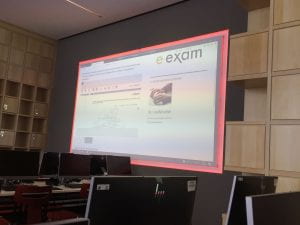
Next, Jochen Dietz gave us a tour of the university’s central e-learning systems. The Centre for Digital Systems (CeDis) supports a holistic view of teaching, learning, and examination. Diagnostic, formative, summative assessment are all supported by CeDis services and platforms. Staff are offered a truly impressive amount of services, incentives, and training to help them incorporate e-learning methods and platforms into their teaching, and the team of e-learning experts to help lecturers set up projects, courses, and webinars. New members of teaching staff have access to a special programme of funding and training. An internal grants process allows more complex blended leaning projects to get off the ground.
Both presenters were positive and enthusiastic about the potential of e-learning and realistic about its challenges. Both predicted that plagiarism detection is going to become increasingly difficult since artificial intelligence can be trained to read and produce writing based on what they have read. In terms of their own service, taking a holistic view when lecturers want solutions to individual problems is an ongoing balancing act.
The next talk moved into territory dear to the heart of many a lecturer and librarian: how can we help students develop the tools to make use our resources and services. Heike Thomas, an FUB librarian who focuses on information literacy, gave a talk about the training her library offers. ‘Lost in digital transformation? Information literacy in times of discovery system technology’ was incredibly wide-ranging. She started by introducing us to the variety of options students have for information literacy training: both university and department libraries offer courses, and these have varying levels of cooperation and collaboration with faculty. There is also a general ‘Informationskompetenz’ course that students can take, split into maths/science and humanities/social science tracks.
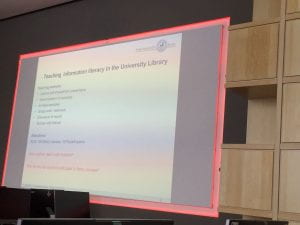
It lasts for 3 weeks, there is homework and an exam. Classes on literature searching are offered at various levels, and embedded sessions can be custom-tailored to focus on help and support for specific databases. In 2018, the university library offered 159 courses and 1215 participants, a very small percentage of the university, took them. Departmental libraries get more students on their courses because of greater proximity, but they also struggle with attendance, so librarians are currently developing online tutorials as a way to potentially reach more students. In addition to supporting students’ information literacy skills, FUB libraries also offer special lectures on this subject to guest users of the library—mostly retirees who want to make the most of the library system.
This fascinating morning was followed by a welcome coffee and tour from Frau Kirsten Hilliger, who directs the Campus Library. It is a beautiful space, with a fountain, plants, and lots of light. A parent and child room, provided with toys and children’s books, provides a dedicated facility within the library for student and staff with young children.
The afternoon was allowed off for sightseeing, so I headed out to investigate the other branch of the State Library. A delicious dinner and a long walk rounded out a very pleasant day!
Open Access, E-publishing, and Research Data: 20 June 2019
Publicly funded research should be available to the public. This, as Dr Agnieszka Wenninger reminded us, is one of the key principles of open access research. One of the founding definitions of open access was provided by the Berlin Declaration (2003) and Berlin’s universities are very much at the forefront of the open access movement. After covering the background of what free access to academic literature means, the differences between gold and green open access publication pathways, Dr Wenniger introduced some fascinating specifics of the German open access landscape and FUB’s open access strategy. This focuses on increasing the percentage of research that is published open access (the target is 60% by 2020), making research data more open and reusable, improving access to cultural heritage through digitisation projects, and building creative partnerships. Staff can apply to a university publication fund (co-funded by the FUB and the German research council) for up to 6,000€ to support open access publication. In addition to monetary and strategic support for open access research, the library actively promotes open access publication through training and workshops. The library seeks out partners in different disciplinary contexts to ensure that the information provided is relevant to researchers of different specialisms. For Open Access Week 2019, their offerings will include an open hardware workshop and a Wikidata workshop through their Wikimedia community partnership.
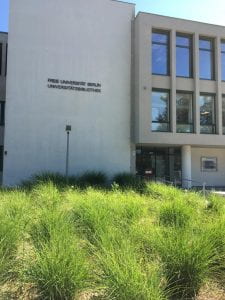
One thing that became very apparent throughout Dr Wenninger’s talk is that the challenges and opportunities of Open Access are best met collaboratively, a theme that was picked up by Mario Kowalak’s talk on Project Deal, delivered by one of his colleagues in the e-resources team. The basic aim of Project DEAL was to negotiate nationwide licensing agreements with the publishers of academic journals in order to address the rapid and unsustainable rise in subscription costs. The project originated at the German university rectors’ conference and was predated by the attempts of regional consortia of German universities to find a way through the pricing situation. Project DEAL is quite new: the preliminary work of setting up the negotiating structure and membership took place in 2016 and developments are ongoing. The current deal reached has been a 3-year contract with Wiley, which has been valid since January 2019, and covers all e-content from Wiley journals and their archives back to 1997. The next three years will be suspenseful: individual pricing for the member universities is tied in part to the number of research outputs they produce. So while the results of the DEAL are still forthcoming, preliminary positive outcomes have been increased visibility and availability of research produced at German universities.
FUB Libraries actively supports the publication of research by providing and supporting a wide variety of publication platforms. As Birgit Schlegel explained the library provides researchers and research students with an open monograph series, an open journal systems, an open encyclopaedia series, and open education resources such as support for the publication of textbooks. I was particularly impressed by the use of the open journal systems at a teaching tool, enabling doctoral students to learn how to peer-review research and write for publication. In addition to its extensive array of publication platforms, the library also supports storage and access to externally published research through its repository, Refurbium. Repository staff work closely with staff from CeDiS to provide open access support, and the repository provides a space to store and publish various kinds of documents as well as data.
After another delicious vegetarian lunch, we returned to learn more about research data management (RDM) and e-research projects. Dr Brigitte Grote began her talk on RDM by pointing out that in the gap between technical questions and scholarly requirements, her library serves as facilitator of conversations between parties who might normally use very different languages. She emphasised that research data management services are crucial to the relevance of research support; as the amount of data is rapidly increasing, good management is key to preserving data and keeping it usable. The management of research data will very different depending on the discipline, but over the past five to ten years the following general outlines have taken shape.
- creating data and planning for its use
- organising, structuring, and naming data
- keeping and providing access to data by securing, storing, and backing it up
- finding and sharing data with collaborators
- publishing and citing data.
As always, one has to consider who does the work and who pays for it. The major national funders of German research also fund research data management but responsibility for putting it into practice is up to institutions and states. In terms of research data management in Berlin, Dr Grote emphasised that this only works in collaboration via the partnership with internal and external partners. Additionally, the RDM team has held a Research Data Management Action Day in order to develop their understanding of what researchers want and need for managing their data. In the future they hope to grow numbers of staff focusing on RDM in order to enhance their connections to researchers.
Marjorie Mitchell, Research Services Librarian at UBC—Okanahgan, in Canada, then presented a case study on research data management at her institution. She started worked on RDM in 2014, and works closely with research administrators at her institution to implement open access solutions, assessment of data management plans, and bibliometrics (she also wears other librarian hats too, such as subject liaison). Her talk focused on two areas:
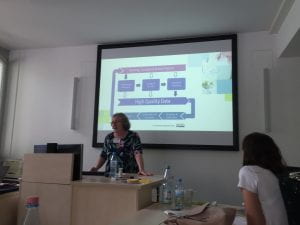
- the development of RDM structures, systems and support in Canada and at UBC
- the practicalities of working with researchers and supporting the management of their data.
The Canadian association of research libraries (CARL) have a working group, Portage, focused on research data management. Recognising that a national solution was needed, the group developed the Data Management Plan Assistant. Nationwide surveys of researchers conducted between 2014 and 2017, showed that researchers wanted more support from the library in terms on managing their data, and as a result Portage created a number of training resources as result, which are freely available online.
In terms of offering RDM training, Ms Mitchell emphasised that the hardest research data management plan to write is the first one, so it is good to tell researchers who have never written a plan before that is going to be a) agonising and b) take a while. Her conversations with researches usually start by acknowledging that she will be asking them questions they will not be able to answer right away, and that building the plan takes time. It is crucial that researchers consider the issue of who owns their data as this can significantly impact how the data is preserved and presented. Her training focuses on helping new and experienced researchers organise their data, visualise data management and comply with funder requirements. She recommends using disciplinary language when talking to researchers about their data. In the future, she and her colleagues are hoping to participate in the development of a data curation service that allows people to deposit best-quality clean data for long-term preservation.
But libraries don’t just preserve research data: they actively create it. The final talk of the day, from Sibylle Söring, discussed e-research projects at FUB. Learning, teaching and research all affected by digitisation, and German research funding bodies have taken an active interest in e-research technologies. E-research combines information technologies and different research methods, and the remit of FUB’s Central for Digital Systems (CeDiS), is to provide the digital infrastructure necessary to do e-research; advice, support and training to enable projects to be carried out; and partnership in projects through research collaboration. One of their key roles is one-to-one support for faculty enabling them to realise projects, and support for discipline specific tools.
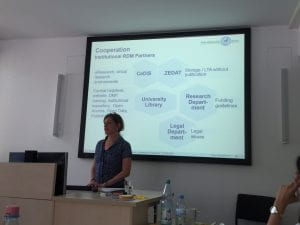
Overall, CeDiS currently has twelve projects in its research portfolio and it is the Principle Investigator on five or these. You can check out the progress of their digital edition of the works of Hannah Arendt here. Their collaboration on the project involves monthly meetings with researchers and a wiki for collaboration and feedback on the interface. A project they are currently developing is an Open Encyclopaedia System, which they hope to offer as a service and platform similar to OJS in two to three years’ time.
The big challenge of this work and these type of projects is sustainability. Many e-research projects receive third party funding, meaning that when the money runs out so does the ability to carry out maintenance work and updates.
I spent my evening being a tourist: I went to the Altes Museum, Berlin’s classical art museum, and thoroughly enjoyed my explorations. I also went to a concert. Soon after being accepted to the programme, I checked the Berlin Philharmonic’s concert schedule—I grew up listening to their recordings, but have never heard them live. The music was inexpressibly beautiful and a wonderful finale to my time in Berlin.
Goodbye and the Red Nose Principle: 21 June 2019
The last day of the programme brought the four strands together at the Ristorante Galileo to say farewell. Britta Piel, from the Centre for International Cooperation, became a clown as a hobby a few years ago, and now volunteers as a clinic clown, putting a smile on the face of people facing health difficulties. She suggested that some of us might well experience stress when returning to our daily grinds away from Berlin, and her parting gift was a way to cope with this. Stress, she said, is about perception, and she taught us the five principles of the clown to help us cope.
- Clowns do everything with their whole heart!
- Play with everything you find: turn it into a game. The opposite of play is depression.
- Celebrate your differences! Clowns love to play in groups.
- My partner is a genius: see the possibilities and the good in the actions of your colleagues and collaborators.
- Come to terms with your own failure and don’t give up
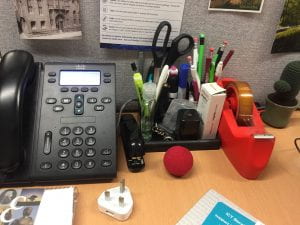
Participants in the programme were treated to a series of clown school exercises, and supplied with a red nose foam nose to make for difficult tasks and phone calls in the return to work a bit easier. It was a thoughtful, funny, and practical gesture that in many ways summed up a wonderful week.
Thank you!
In short, if you get the opportunity to go to an Erasmus Staff Exchange Week or the Freie Universität Berlin: Go! I cannot recommend the experience enough.
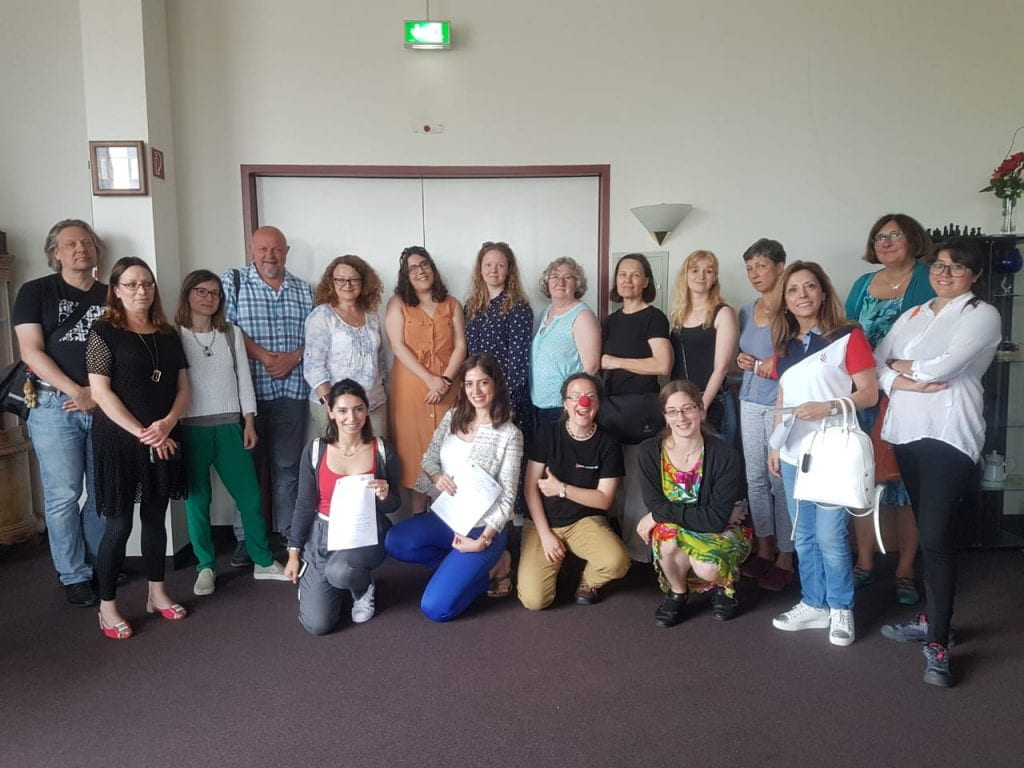
The last thing that remains is to express sincere thanks to all of the FUB staff who organised such a wonderful week, particularly Cosima Wagner and Dominik Hagel, who were terrific. All of the wonderful librarians, e-examinations staff, and e-researchers who spoke throughout the week have my sincere gratitude—as I hope is clear from the post, I was inspired by and learned a great deal from their words. I learned just as much from the wonderful participants in the programme, whose company was truly a pleasure. Thank you.
